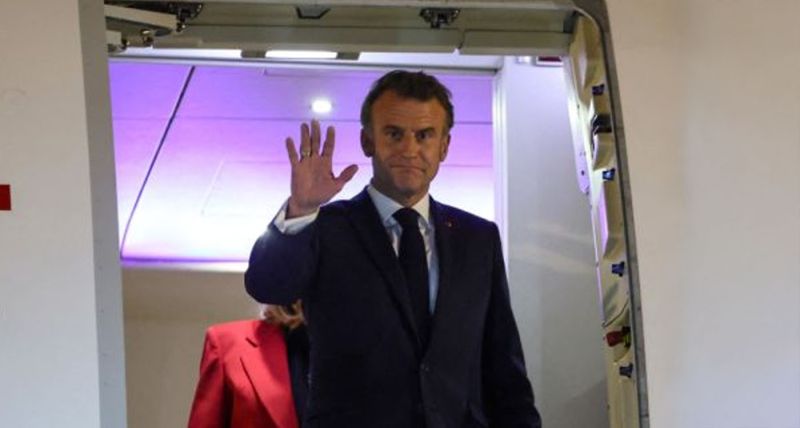
In Hanoi, a gesture from Brigitte Macron toward her husband sparked controversy. Was it a slap or an innocent touch? Beyond the image, a psychoanalytic reading explores what this moment reveals about the couple, about power and about ourselves.
Certain gestures exceed their expected boundaries and unsettle the scene in which they occur. Brigitte Macron’s gesture, filmed as she stepped off a plane in Hanoi on May 25, is a striking example. This fleeting moment—interpreted alternately as a slap or a simple sign of complicity—ignited a torrent of interpretations. Beyond the anecdote, it is the sudden intrusion of an ambiguous act at the intersection of the private and the political that provokes reflection, blurring the lines between intimate identities and official roles.
From a psychoanalytic perspective, this scene resists a moralistic reading or dismissal as a trivial news item. It invites us to consider what it reveals about the collective superego, underlying tensions and the projections placed upon the presidential figure. What stands out is the dissonance: this gesture disrupts the meticulously choreographed protocol, introduces a divergence in the performance of power and sparks a peculiar and diffuse pleasure within the media sphere.
In 1957, Polish historian Ernst Kantorowicz published an essay titled “The Two Bodies of the King,” in which he explained that the king—and by extension, the president—possesses two bodies: a mortal, physical body and a symbolic, immortal body that embodies the continuity of the state. In republican modernity, this duality endures in a different form: the head of state on one side and the private individual on the other. Emmanuel Macron, as president, embodies this duality. Yet, the scene in Hanoi reveals not the official leader, but the private man, entangled in a conjugal relationship rife with ambiguities, tensions and gestures that slip beyond the stoic mask of a false self. Here, we no longer see the polished and controlled president, but a man in his marital relationship, exposed in a spontaneous and subjective act.
This rupture between the official image and the emergence of intimacy unsettles. The camera captures a moment that escapes the scripted narrative. Within this deviation lies a fracture—the disruption of a power suddenly unbalanced, the faltering of a relationship between two, laid bare under the scrutiny of spectators. What this gesture reveals is less an act of alleged violence or inappropriate familiarity than the fragility of a role typically so meticulously upheld.

France's President Emmanuel Macron waves in front of his wife Brigitte Macron as they prepare to disembark from the plane upon their arrival at Noi Bai International Airport in Hanoi on May 25, 2025. © Ludovic MARIN / AFP
Since their public emergence, Emmanuel and Brigitte Macron have been the focus of a media and fantasy narrative that transcends politics. Their unconventional relationship fuels projections and judgments. In psychoanalysis, the couple often becomes a site of identification and transference. What we see in the duo—and what we think we perceive—reveals, in truth, more about ourselves: our relationships to power, authority, masculinity and femininity within each of us and how they interact within the couple relationships.
The gesture captured in Hanoi, whatever its exact nature, marks an intrusion of the active feminine into a traditionally masculine realm of power. It unsettles the expected representations of the president’s wife, long confined to a discreet role. Here, roles blur: Who holds the posture of authority? Who corrects, who performs? And above all, who observes?
Lacan emphasized that the unconscious reveals itself through the language of the Other. Brigitte Macron’s gesture, witnessed by millions, becomes part of a complex discourse that transcends its immediate meaning. It speaks not only of the couple, but also of power, gender and the public’s expectations. In this scene, the private and public intertwine.
The power of this sequence lies in the spectator’s role as voyeur. Like a theater curtain rising to expose an intimate scene, the gesture’s brevity invites endless interpretation. It becomes a collective enigma, with each individual striving to decode it through the lens of their own interpretations. Ultimately, it is not the Macron couple under scrutiny, but our own hidden shadows—our emotional and relational tensions surrounding sexual identity, intimacy and the dynamics of relationships and power within a couple.
Emmanuel Macron’s reflex of raising his hand to his face carries profound symbolic weight. It marks a moment of disorientation, a rupture in bodily control. The public figure yields to the private individual, caught off guard. The gesture seems to ask, “What is happening to me here, in front of everyone?”—a question that captures what anyone might sometimes experience: the rupture between the social facade and one’s inner truth.
The magnitude of the controversy is, in itself, meaningful. In attempting to dismiss the scene through controlled communication—labeling it a mere game and denying any violence—the presidential entourage contributed in heightening its significance. What is hastily denied often resurfaces with greater force. Freud asserts that the unconscious never truly yields.
In a society overwhelmed by narratives, even the smallest breach in the official story transforms into an event. The presidential body, meant to embody stability and control, becomes a screen for projections and a vessel for collective fantasies. This gesture crystallizes the contradictions of an anxious era, where even the slightest deviation divergence is seen as a telling symptom.
This viral television moment is no mere domestic anecdote, it is a rupture where reality forcefully asserts itself. As language falters and control fractures, a truth emerges. For the psychoanalyst, such instances are not about passing judgment, but recognizing a manifestation of the subject beyond official discourse, ensnared like anyone else in the tangled complexities of the couple relationships.
A slap? Perhaps. But more than that, a revealing misstep, an act that lays bare all the presidential function strives to conceal.




Comments